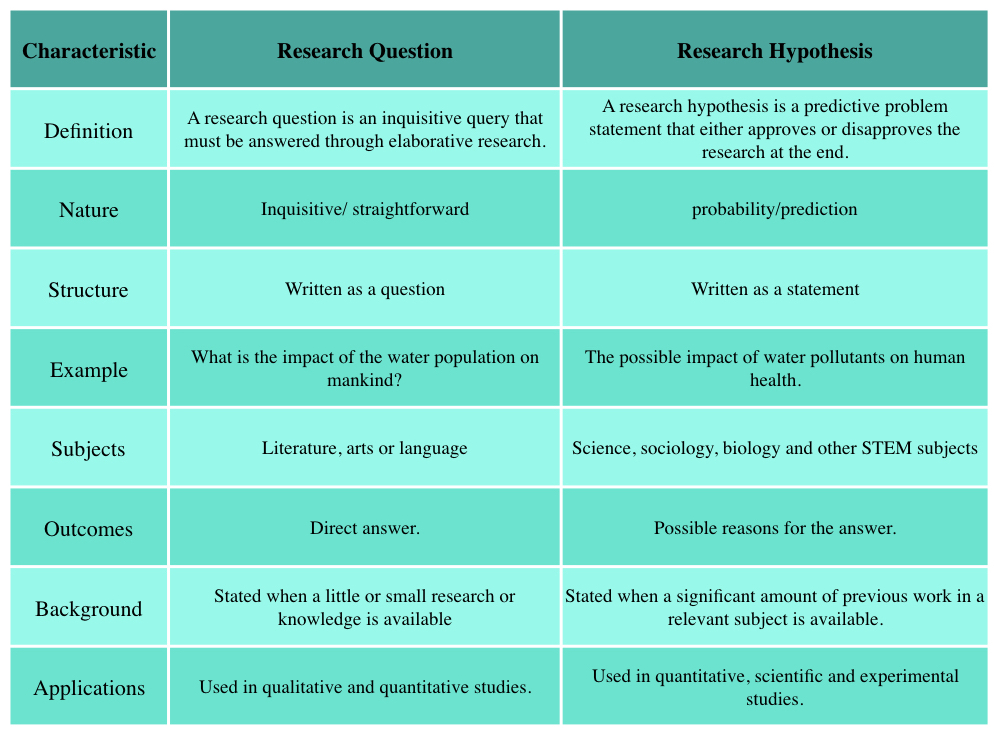Stating, developing and addressing a research question and developing & justifying the research hypothesis has vital significance in the research process. Both help researchers to approach PhD/research/ projects.
“Research” is a word important for PhD which includes complex processes of finding new knowledge. A PhD candidate has to prepare a project & research proposal, identify a research gap, state a question, prepare a hypothesis and then do research.
It includes tedious pre-preparation, lucrative research and frustrating post-preparations phases. So overall the research process though is inquisitive but can be managed by discipline and zero date planning.
So to prepare for PhD, do it with ease and complete it joyfully; one has to understand every element correctly before starting their research. And for that tons and tons of articles and previous research must be read first.
In addition, as we talked about, precisely identified research problem helps in stating an excellent research question or research hypothesis. Notwithstanding, students usually don’t understand what a research question or hypothesis is!
The present blog content will focus on differences between research question and hypothesis and may let you understand what each term is. I hope this article will help you learn the PhD research process more accurately.
Stay tuned,
Research question:
Does this article explain some common differences between a research question and a research hypothesis?
Research hypothesis:
This article explains the major differences between the research question and the research hypothesis.
What is a research question?- Simple explanation
Put simply, a research question is a clear and concise question of the study that must be answered at the end. The answer usually is Yes/No type but clearly fills the gap.
Example of research question:
Let’s take an example,
What are some common problems the LGBT community faces globally?
Suppose, this one is one research question around which the researcher has to prepare its study. What can he or she do with this topic?
- Conduct gatherings of the community.
- Conduct one on one interviews.
- Conduct News sessions
- Study previous literature.
- Organize some Games and invite LGBT community people to take part.
That’s it, Nothing else he or she can do.
No statistical analysis is required and performed for this study so the outcome of this study possibly is “problems”. And it can be solved, perhaps. Note that in-depth mathematical models, statistical analysis and other scientific studies aren’t required here.
Some other examples of research questions are:
- What are the side effects of social media addiction on youth?
- What are the factors that negatively impact the mental health of US people?
- How effective carbon emission control strategies are?
Now let’s understand the research hypothesis.
What is a research hypothesis?- Simpler explanation
A research hypothesis is postulated in order to predict the results either negative or positive. Notedly is used so often in scientific, experimental and quantitative research.
The research hypothesis is a predictive model for getting results.
Example of research hypothesis:
Let’s take an example,
The effect of time and temperature on biological sample transportation.
This study includes exclusive statistical analysis and data-driven studies to investigate the effect of various temperatures and times on biological specimen transportation.
Outcomes of the study will prove that at which temperature a biological sample can be safely transported.
The outcomes are,
- Some data
- Statistics
- The temperature which isn’t good
- The temperature which has is best
- The tolerable zone for transportation
Etc…
To interpret these kinds of results in-depth mathematical models, statistical analysis, scientific experiments and other biological studies are needed.
Some of the examples of research hypotheses:
- The effect of time and temperature on biological sample transportation.
- Effect of various doses of antiviral Oseltamivir drug against viral pathogenicity.
- Various global warming agents and their impact.

I think you get a brief idea about how each term is different. Some of the technical differences between the research question and hypothesis are explained here.
Differences between research question and research hypothesis:
A research question is developed depending upon the problem or gap identified while the hypothesis is prepared based on the existing knowledge.
More than one research question is present in a single study, while the entire research is developed around a single hypothesis that is either proven or disproven at last.
In-depth knowledge of the subject and huge data or research studies are required to state a research hypothesis; whereas the research question can be stated using a small group of research data or knowledge.
This indicates that the relatedness among different variables is pretty uncertain for the research question while is highly related in the case of hypothesis.
A research question is “brief” yet includes all the important information and is open to debate which typically gives an excellent varied degree of output.
On the other hand, the research hypothesis is a kind of formal statement- (will be proved or disproved) which assumes the relatedness between two or more variables selected for the study.
For example,
The number of patients, population size, sample type or method selected for the study.
Both- qualitative and quantitative studies rely on the research question, however, the hypothesis can be postulated mostly for the quantitative or experimental studies.
Depending upon the nature of the study, the research questions are of three various types which are casual, descriptive and comparative questions while the hypotheses are causal, null, directional or non-directional.
A thesis question must be answered; A hypothesis must be tested.
The research question is more an elaborative research term while the hypothesis is more scientific and predictive in nature.
Henceforth, research questions are usually used in elaborate studies in subjects such as language, arts and literature. And as we said, that’s pretty straightforward.
For example,
The impact of the “Macbeth play” on European people.
On the other hand, the research hypothesis is based on possibilities and probabilities whose final results either or neither prove the study and therefore include a purely scientific explanation, mathematics, equations and statistical analysis.
Studies in science, biology and sociology rely on hypotheses (that must be tested first).
For example, the impact of temperature and time duration on sample transportation and storage.
Read more:
Summary: research question vs hypothesis:
| Characteristic | Research question | Research hypothesis |
| Definition | A research question is an inquisitive query that must be answered through elaborative research. | A research hypothesis is a predictive problem statement that either approves or disapproves the research at the end. |
| Nature | Inquisitive/ straightforward | probability/prediction |
| Structure | Written as a question | Written as a statement |
| Example | What is the impact of the water population on mankind? | The possible impact of water pollutants on human health. |
| Subjects | Literature, arts or language | Science, sociology, biology and other STEM subjects |
| Outcomes | Direct answer. | Possible reasons for the answer. |
| Background | Stated when a little or small research or knowledge is available | Stated when a significant amount of previous work in a relevant subject is available. |
| Applications | Used in qualitative and quantitative studies | Used in quantitative, scientific and experimental studies. |
Wrapping up:
If you are designing scientific research for your PhD, perhaps stating a hypothesis may help you more, although you can raise a question as well to investigate the knowledge.
Research, as I said, is a complex process, needs the experience to design.
Early learning may pretty helpful for students to understand the thing well. And hence this article and series of articles on this blog are meant for PhD students.




